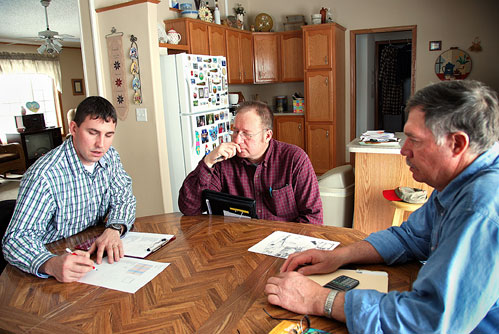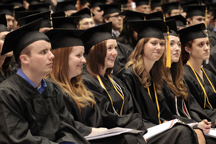May 6, 2010

ISU Extension field agronomist Mark Licht (left) and Wayne Roush (center), superintendent of the ISU Western Research and Demonstration Farm, study aerial maps and discuss possible on-farm research trials with Vail farmer Rick Rosner in his home. Each year, Licht helps coordinate collaborative on-farm research with farmers and ISU Corn and Soybean Initiative agribusiness partners as part of the initiative's on-farm research program. Photo by Tamsyn Jones.
Agronomist uses relationships, research to boost Iowa ag
by Tamsyn Jones, Agriculture and Life Sciences Communications
A grain auger hums and flowing yellow corn stands out against swirling snowflakes on a gray March morning. ISU Extension field agronomist Mark Licht opens his truck door and smiles at the farmer filling his grain truck, who walks over and returns the greeting.
Soon the two are talking shop: how the farmer's crop fared; his purchase of a continuous flow grain drier; corn spoilage after the wet 2009 harvest; Licht's recent trip to Ukraine; the planned Highway 20 overhaul; and whether the pop-up snowstorm would interfere with the farmer's grain delivery.
A truck-side meeting in the midst of a brewing snowstorm may seem an odd place to conduct crop business, but for Licht it can be routine -- especially if it accommodates the grower.
"It's important to have an office, but the truck is an office as well," said Licht, who is based in Carroll but more often finds himself rolling down country roads in the 11 west central Iowa counties he serves. He averages 15,500 work miles annually.
"It's been a big change to get a phone with a data plan," he said. "I can check and respond to e-mails on the go and spend more time meeting with growers and co-ops."
Partnering with producers on research projects
That morning, Licht was meeting Sac City grower Dale Drey to discuss possible collaborative on-farm research projects within ISU's Corn and Soybean Initiative. The initiative set up the research program to answer farmers' crop production questions. Drey farms two locations, so Licht asked for a convenient time and took the meeting to him.
Afterward, Licht set off through the thickening snow to meet Wayne Roush, superintendent of the ISU Western Research and Demonstration Farm near Castana, at an appointed roadside rendezvous near Vail. As the initiative's liaison in his Extension territory, Licht helps Roush find potential participants for the research facility's first on-farm research trials.
Conversing from their trucks, they considered the worsening roads and whether to forge ahead with plans to meet with two other potential research recruits.
"Rick said he has time this afternoon," Licht said, referring to a Vail farmer. "I'd hate to cancel because of the weather."
"Farming is in my blood, having grown up on a farrow-to-finish hog, corn and soybean farm. I enjoyed being in the corn and soybean fields, no matter how many weeds needed pulling or rocks had to be picked up. I want to be able to work with farmers to improve profitability and productivity, and being in Extension allows me to do that."
-- Mark Licht
Building bonds to better Iowa ag
That attitude, underscored by the day's adventures, illustrates how Licht strives to put Iowa farmers first. For Licht, being an Extension field agronomist isn't about tromping through verdant crop fields scouting pests or fixing problems -- the work many may associate with agronomy extension.
It's about building relationships with the growers, agribusiness partners of the initiative, colleagues and the agriculture community he serves. It's also about meticulous planning, attention to detail and a "seize the day" attitude that led Licht to do everything from collaborating with local businesses on education events to cultivating a shrewdness for obtaining outside funds for initiatives he otherwise could not do in tight budget times.
"I'm always looking for ways to improve my programming," Licht said. "It's just a reality of the times that you have to do more yourself with less. So I've found that applying for grants or involving local businesses or organizations can help me do more programming for growers while also building a relationship with those businesses."
Reaching out through research
Since taking over the field agronomist job in 2006, Licht has strengthened west central Iowa's crop research program and, in the process, boosted Extension's profile in his area.
For example, working with a local grower curious about switching to 20-inch row corn, and aware of the growing local interest in the question (30-inch row corn still is the norm), Licht applied in 2009 for an ISU on-farm research and demonstration grant. The grants typically are awarded for a single year, but Licht knew he'd need at least two years of data to help answer questions on yield. He emphasized that need in his application -- and got the grant, worth nearly $7,000.
He used his relationship with Farmer's Cooperative of Farnhamville, a Corn and Soybean Initiative partner, to seek additional funds to offset the grower's costs of purchasing a 20-inch combine head.
"They gave $2,000 and will give $2,000 this year," Licht said. "I had a good relationship with my contact there, and the grower was really interested in the project. That's why it's so important to build those relationships with initiative partners."
Licht then convened a field day last August to inform other local growers about the project's first-year findings.
"We went from no programs in west central Iowa and the Sac City area in plant populations about three years ago to having a well-developed, structured program now," he said.
A focus on education
Licht is well qualified to spearhead west central Iowa's on-farm research program. He has dual bachelor's degrees in agronomy and ag education and a master's degree in soil science. In a previous job he set up trials as a program specialist for the Iowa Learning Farm, a statewide effort to promote efficient and environmentally sound crop production by linking growers, ag businesses, state agencies and the public on education and demonstration projects. In fact, as a master's student, he helped write the grant that got the Iowa Learning Farm started.
Licht's commitment to helping growers is evident. Between December and March, he led 38 winter meetings, tailoring each to local farmers. In March, he spent two weeks of his personal time advising Ukrainian farmers on crop production practices as a volunteer with the international non-profit CNFA. He received the North Central 2009 National Extension Leadership Development award, a program that will take him to four locations around the country this year for personal development and leadership training.
His schedule keeps him busy. But to Licht, it's a passion he has felt his whole life.
"Farming is in my blood, having grown up on a farrow-to-finish hog, corn and soybean farm," he said. "I enjoyed being in the corn and soybean fields, no matter how many weeds needed pulling or rocks had to be picked up. I want to be able to work with farmers to improve profitability and productivity, and being in Extension allows me to do that."
